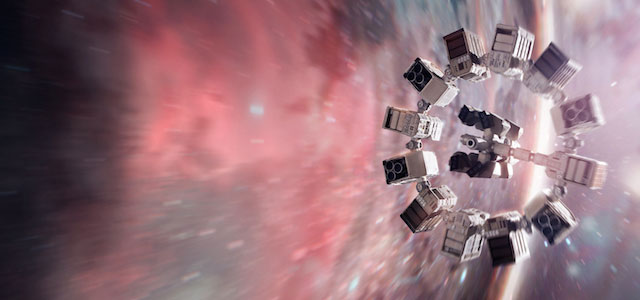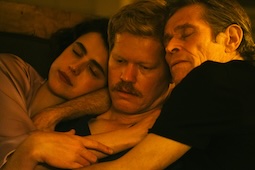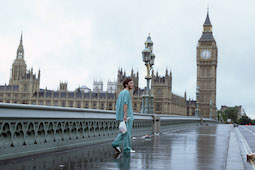
With Christopher Nolan tipped to win his first Oscar for Oppenheimer, we're thrilled to bring the director's sweeping Interstellar back to the big screen. It's playing as part of our Sci-Fi Season and if you missed Interstellar at Cineworld the first time back in 2014, this is your chance to make amends with a mindblowing cinematic experience, both visually and sonically.
Matthew McConaughey plays the astronaut farmer Cooper who must travel through a wormhole to find a new home for mankind. Cooper's journey plays out against Nolan's vast cinematic canvas and a key facet of this is composer Hans Zimmer's rapturous, organ-led score that catapults us to the stars and beyond. (Don't forget that we'll soon be hearing Zimmer's work on Dune: Part Two.)
Interstellar returns in IMAX, allowing Zimmer's score to attain even greater resonance and dimension via a perfectly tuned integrated sound and speaker system. The movie is also playing in Cineworld-exclusive Superscreen, which emboldens the sonic presentation with epic Dolby Atmos speakers.
Don't pass up the chance to bask in a thunderous Hans Zimmer symphony on the big screen at Cineworld. Here are five of the best soundtrack moments you need to hear again in all-encompassing surround sound, which promises an immersive experience you won't find anywhere else.
1. 'Stay'
The story behind the Interstellar soundtrack is famous. Christopher Nolan wrote a brief note for Hans Zimmer containing two lines of dialogue: "I'll come back"/"When?" From there, Zimmer tapped into his feelings of being a father and composed an initial piece, playing it back to Nolan before shooting had even begun.
The director then responded: "Well, I'd better make the movie now... I now know what the heart of the story is.’"
It's quite rare for a filmmaker to have so much faith in their composer, and Zimmer's musical spirit subsequently powers the entire production. The composer based the score around the sound of a church organ whose ecclesiastical, spiritual sound is appropriate in a story about reaching beyond the known world in search of personal redemption.
This thunderous, slow-burn musical texture steals up from the soundtrack's first piece 'Stay', where it becomes the melancholic bedrock theme of the relationship between Cooper and his daughter Murph. The latter is played by a child by Mackenzie Foy and as an adult by Jessica Chastain; such is the nature of Cooper's space mission that mere seconds for him equals the passing of many years for his daughter.
Zimmer's powerful tonalities underline the film's sense of longing as Cooper clutches for the time that has been lost.
2. 'Mountains'
Zimmer deviously plays around with the passage of this time in this suspenseful track. It accompanies the famous mountain-wave planet sequence where, as Cooper explains, one hour equals seven years back on Earth.
The composer introduces a subtle tick into the soundscape and this clock-like urgency also has a mathematical sense of precision: the ticks occur every 1.25 seconds, which is the equivalent of one whole day passing on Earth, relative to Cooper's calculations. (Check out the math here.)
The music is therefore not just a suspenseful device as Cooper and his team attempt to escape the deadly planet, known as Miller, but it also implicitly conveys how Murph is ageing, sight unseen. This has drastic consequences for Cooper in the next sequence when he receives a video message from his now-adult daughter. On subsequent viewings, we realise how Zimmer's superbly detailed score has primed us for this devastating moment.
3. 'Coward'
Working out of their Remote Control Studio in Los Angeles, Zimmer and his musical protéges have over the decades established a singular musical sound that both enhances and distorts organic musical set-ups. This approach comes into its own during Interstellar's most shocking scene, which reveals Matt Damon's brilliant scientist Dr Mann as a turncoat.
Zimmer relies on his signature layers of bombastic sound that gradually escalate in intensity as the cowardly Mann attempts to escape back to Earth while leaving Cooper and his team behind. Droning synthetics mix with propulsive blasts of the organ, Zimmer reminding us how good intentions have gone badly awry at this stage of Interstellar's narrative, a rescue mission now undone by a scientific mind gone mad.
It's loud, overwhelming and a driving factor in the narrative, hearkening back to Zimmer's work with Nolan on the Dark Knight trilogy and anticipating the 'wall of noise' approach he would later favour in Dunkirk (2017). It's music as a form of revelation, albeit not the pleasant kind.
4. 'No Time for Caution'
Remarkably, the score's most thrilling track wasn't even included on the original soundtrack album. Following Mann's death via airlock, Cooper attempts a seemingly impossible docking procedure with the out-of-control Endurance craft, and if the visuals weren't spectacular enough, Zimmer's spine-tingling score pushes the sequence over the edge.
The score once again builds with ticks and percussive strikes before the resonant organ emerges and takes over with a cyclical rhythmic pattern that mirrors the Endurance's wild spinning movements. The organ elevates in volume and tonality as Cooper's skills are put to the test in the ultimate bid to salvage the mission and help save humanity.
One can sense how Zimmer, working with Nolan, is doffing his cap to the avant-garde, somewhat abstract musical choices deployed by Stanley Kubrick in his seminal 1968 movie 2001: A Space Odyssey. There's an ecstatic, wondrous tone to the organ, almost akin to a spiritual anthem of human endeavour and bravery. However one interprets it, one cannot deny that the track sees Zimmer at the peak of his powers.
5. 'Where We're Going'
Interstellar is one of Zimmer's most cohesive and enthralling soundtracks, carefully utilising specific themes and motifs that gradually find their cathartic resolution at the close of the narrative. It's often said that composing for space offers composers a significant advantage as music can fill the vacuum where concrete sound is notable by its absence.
In the case of Interstellar, Zimmer's music not only occupies the physical vacuum of our solar system but also that emotional void that exists within Cooper and Murph. The two characters may be physically separated by oceans of time but Zimmer can conjure those invisible threads that keep them emotionally conjoined, primarily via the yearning sound of the organ.
It's a sound that we objectively recognise as humans from our Earthbound perspective, but it's also one that leaps beyond our physical bodies to suggest a divine, if intangible purpose, that propels us forward. Come the tesseract sequence at the end of Interstellar, whereby Cooper and Murph can fold space-time for their redemptive purposes and that of mankind, and Zimmer has made us believe in something beyond the realm of the physical. That's the sign of a truly great soundtrack.
Click the link below to book your tickets for Interstellar. The film returns to Cineworld screens on February 13th.














.jpg)
.png)



